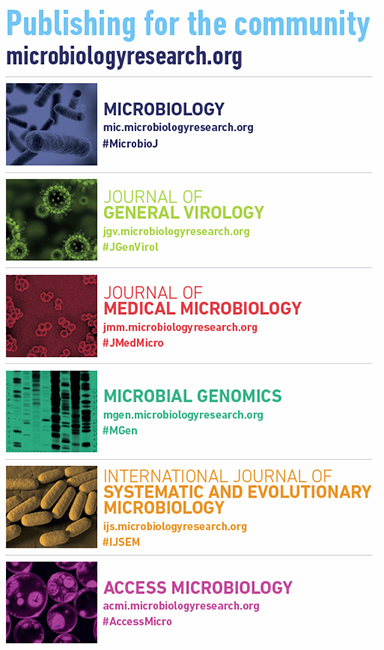The new face of Microbiology
Issue: Natural Products and Drug Discovery
05 November 2019 article

Microbiology is the Microbiology Society’s founding and flagship journal. The journal publishes fundamental and applied research across the breadth of the field of microbiology and supports the exchange of knowledge on key topics such as new and emerging diseases, antimicrobial resistance, food security, environmental sustainability and health.
We spoke to Tanya Parish, Editor-in-Chief of Microbiology, and Gavin Thomas, Deputy Editor-in-Chief, to outline why Microbiology remains an important place to publish and how its revised scope will better meet the needs of the microbiology community.
Why is Microbiology important, and why are you involved with it?
Tanya Parish (TP): Microbiology is the flagship journal of the Society, playing a pivotal role in the dissemination of information between microbiologists. It aims to connect scientific communities and stimulate ideas and new research. I have been associated with the journal for many years, as an Editor, then Senior Editor, and finally Editor-in-Chief. As a scientist, it is important to me to include activities that benefit other microbiologists – whether that is reviewing papers, discussing methods and approaches with students at meetings, or in this case, taking on the responsibility of developing new initiatives with the journal. In addition, I felt it was an important way to ensure that we address issues of gender representation and diversity. And, of course, I got to continue working with some fantastic colleagues, both on the Editorial Board and in the Society’s Publishing Team.
Gavin Thomas (GT): As a member of the Society for almost 20 years now, I have benefited massively from its activities in my career, and so have my PhD and postdoctoral students. From my first meeting, I was welcomed into the family of microbiologists and found the Annual Conference as the main way to learn about the best new science and meet the scientists themselves. I got a travel grant to enable me to attend this first meeting; membership for students was cheap and they sent me a magazine with lots of cool articles and news. As I became a Principal Investigator myself and grew my own group, I was delighted to become an Editor for the journal and then later Senior Editor, and it became clear to me how important the journal is for running all the other activities of the Society. The continued success of Microbiology is central to the continued success of the Society. By working with our membership who benefit most from the success of Microbiology, we need to revitalise the journal to make it an exciting place to publish. ‘Publishing for the community’ is our tagline and this is really true – it’s about the microbiology and ensuring the future of the Society.
Why have you changed the scope?
TP: Microbiology has been important since the beginning of civilisation, from many perspectives. Microbiology has always aimed to cover the widest breadth of research, reflecting its key role in science and society. As new research areas develop and old areas change, we need to keep up with these developments. Our scope sets out the journal’s scientific vision and provides a home for all those new areas. For example, microbiology will play a key role in delivering the United Nations Sustainable Development Goals. We have broadened our scope to include newer areas like microbiomes and antimicrobial development, as well as applied and translational research, but have also tried to simplify the way we present it, so it is more welcoming. We are looking for articles that advance our knowledge in the broadest sense. Articles should include novel work, be conducted to rigorous methodological and ethical standards, and have sound conclusions.
Why should members publish with Microbiology?

TP: We have a robust and fair peer review process, overseen by a world-class Editorial Board; a fast time-to-publication for accepted papers; it’s free to publish and we have a liberal Open Access policy. For Society members, most importantly, we provide financial support to other Society activities.
GT: We are making the link between the journal and the Society much clearer to members. We are also starting new activities to promote the link of the journal to the community, the first of which is the creation of the actinobase.org wiki.
TP: Members can also get involved by volunteering for the reviewer database or putting their name forward to be considered as an Editor. Suggestions for collections, special issues and/or Focused Meetings are also welcomed.
Where do you see the journal in five years?
TP: Microbiology as a field is always developing, so we may see new areas being included. The biggest changes we expect to see are not in terms of publications, but in the work we do, in the broader sense of supporting communities. Over the past five years, we have introduced two new article types, graphical abstracts, a board of reviewers and a volunteer reviewer database, as well as poster and speaker prizes at conferences, and we expect to continue introducing new initiatives.
GT: I want to see scientists fully engaged with the journal again and publishing their work there as a matter of choice. When you have a solid piece of work you want to be well reviewed and well read then you should publish in a Society journal to help support our work, rather than the shareholders of commercial publishers.
Image: iStock/ClaudioVentrella.
